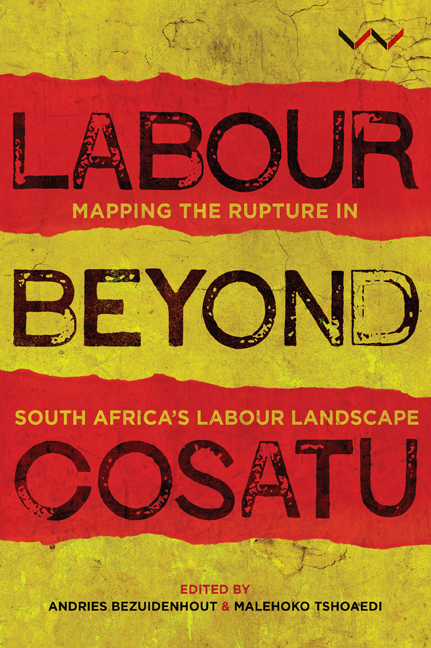Book contents
- Frontmatter
- Contents
- Figures and Tables
- Abbreviations and Acronyms
- Preface
- Chapter 1 Democracy and the Rupture in South Africa's Labour Landscape
- Chapter 2 Research in a Highly Charged Environment: Taking Democracy Seriously, 2014
- Chapter 3 The Social Character of Labour Politics
- Chapter 4 Is Cosatu Still a Working-Class Movement?
- Chapter 5 Labour Aristocracy or Marginal Labour Elite? Cosatu members' income, other sources of livelihood and household support
- Chapter 6 The Politics of Alliance and the 2014 Elections
- Chapter 7 Cosatu, Service Delivery, Civil Society and the Politics of Community
- Chapter 8 The Politics of Male Power and Privilege in Trade Unions: Understanding sexual harassment in Cosatu
- Chapter 9 Internal Democracy in Cosatu: Achievements and challenges
- Chapter 10 Public Sector Unions in Cosatu
- Chapter 11 Are Cosatu's Public Sector Unions Too Powerful?
- Chapter 12 Labour Beyond Cosatu, Other Federations and Independent Unions
- Contributors
- Index
Chapter 5 - Labour Aristocracy or Marginal Labour Elite? Cosatu members' income, other sources of livelihood and household support
Published online by Cambridge University Press: 21 March 2018
- Frontmatter
- Contents
- Figures and Tables
- Abbreviations and Acronyms
- Preface
- Chapter 1 Democracy and the Rupture in South Africa's Labour Landscape
- Chapter 2 Research in a Highly Charged Environment: Taking Democracy Seriously, 2014
- Chapter 3 The Social Character of Labour Politics
- Chapter 4 Is Cosatu Still a Working-Class Movement?
- Chapter 5 Labour Aristocracy or Marginal Labour Elite? Cosatu members' income, other sources of livelihood and household support
- Chapter 6 The Politics of Alliance and the 2014 Elections
- Chapter 7 Cosatu, Service Delivery, Civil Society and the Politics of Community
- Chapter 8 The Politics of Male Power and Privilege in Trade Unions: Understanding sexual harassment in Cosatu
- Chapter 9 Internal Democracy in Cosatu: Achievements and challenges
- Chapter 10 Public Sector Unions in Cosatu
- Chapter 11 Are Cosatu's Public Sector Unions Too Powerful?
- Chapter 12 Labour Beyond Cosatu, Other Federations and Independent Unions
- Contributors
- Index
Summary
WORKERS, HOUSEHOLDS AND SOUTH AFRICA'S SOCIO-ECONOMIC ORDER
This chapter attempts to examine critically the view of Cosatu workers as a labour aristocracy or a ‘self-interested’ elite. It does so by examining wage data gathered from members of Cosatu affiliates in the fifth of a series of surveys of Cosatu membership which have been conducted since 1994, and it looks at the wage data through a number of other variables derived from questions in the 2014 survey of membership.
The notion of Cosatu members as a labour aristocracy can be related to the growing divisions in the labour market between permanent and temporary workers and high-income and low-income earners (see Forslund and Reddy 2015: 84–88). Our data suggests that Cosatu does not organise many temporary workers but it does organise workers who earn low wages. Importantly, those who support the labour aristocracy thesis often use labour market data as applied to individuals. In this chapter we take seriously the point that trade union members support dependents on their wages. Pnina Werbner's (2010) use of the notion of a ‘marginal labour elite’ provides a far more useful way of understanding Cosatu's membership. Werbner's ‘marginal labour elite’ locates trade union members outside of the workplace and in relation to their social reality by focusing specifically on their role in the household as a wage earner.
Twenty years into democracy, South African society is still marked by immense socio-economic problems such as chronic levels of unemployment and incessant levels of poverty and inequality. The number and intensity of strikes have increased in private and public sector workplaces. Globally, in the phase of informationtechnology- led capitalism, the number of workers employed as permanent workers is decreasing as the number employed as temporary, casual or part-time workers is increasing.
This trend is explained by Jan Theron's (2010) description of the interrelated processes of ‘informalisation from above’ and ‘informalisation from below’. Whereas ‘informalisation from below’ refers to those who engage in survivalist activities or self-employment, ‘informalisation from above’ is a response to employers’ efforts to restructure workplaces by externalising labour. This process fragments and differentiates the workforce by creating a layer of workers who, despite being located in the formal workplace, find themselves on the outside of labour legislation and collective bargaining because their employer, the service provider, determines their working conditions and is not legally bound to an employment relationship with the core business.
- Type
- Chapter
- Information
- Labour Beyond CosatuMapping the Rupture in South Africa's Labour Landscape, pp. 62 - 84Publisher: Wits University PressPrint publication year: 2017



